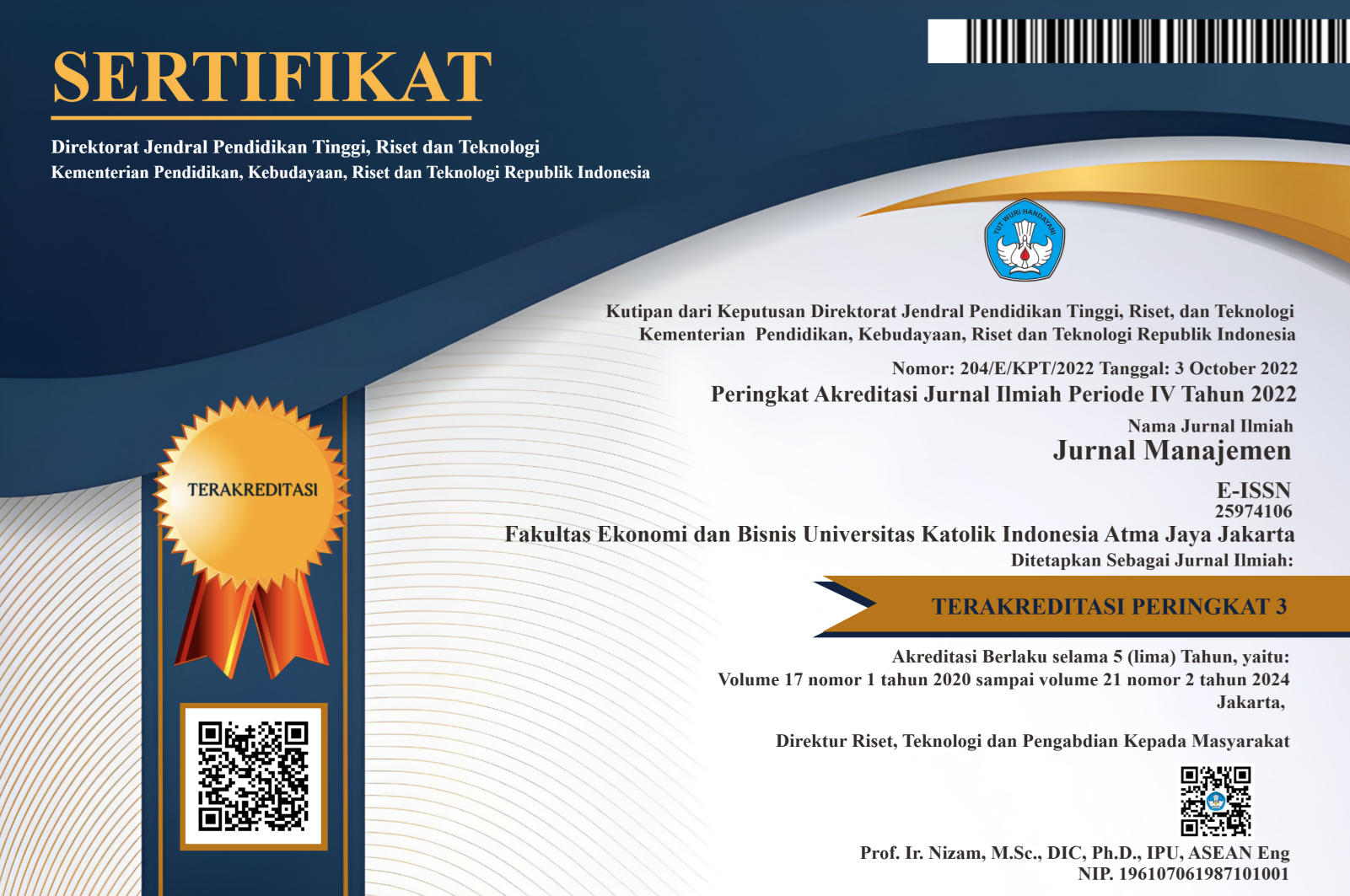PENGARUH EMPLOYEE CREATIVITY TERHADAP JOB PERFORMANCE YANG DIMEDIASI OLEH JOB SATISFACTION PADA KARYAWAN XYZ HOSPITALITY KOTA BANDUNG
DOI:
https://doi.org/10.25170/jm.v18i1.2266Keywords:
Employee Creativity, Job Satisfaction, Job PerformanceAbstract
The purpose of this study was to see the effect of employee creativity on job performance mediated by job satisfaction. This research was conducted at XYZ Hospitality Bandung City. Respondents in this study were 65 employees who worked in 5 (five) departments, namely Marketing & Sales, Personnel (Human Resource), Food & Beverage, Room Division, and Purchasing. The method used is Non-Probability / Non-Random Sampling. Data processing was performed using IBM SPSS Statistics 26 and Macro Hayes PROCESS software. The results of this study indicate that (1) employee creativity has a positive and significant effect on job satisfaction, (2) job satisfaction has no significant effect on job performance, (3) employee creativity has a positive and significant effect on job performance, and (4) employee creativity has no effect on job performance with job satisfaction as a mediating variable.
References
Yee, W. F., Pink, L. S., & Sern, M. L. C. (2014). The effect of a psychological climate for creativity on job satisfaction and work performance. International Journal of Economics and Management, 8, 97-116.
Zhao, X., Lynch Jr, J. G., & Chen, Q. (2010). Reconsidering Baron and Kenny: Myths and truths about mediation analysis. Journal of consumer research, 37(2), 197-206.
Stasielowicz, L. (2019). Goal orientation and performance adaptation: A meta-analysis. Journal of Research in Personality.
Ravikumar, R. K., & Raya, R. P. (2019). Impact of Performance Appraisal on Organizational Citizenship Behaviour and Intention to Stay through Affective Commitment: A Literature Review. International Journal of Scientific Research and Management.
Choi, J. Y., Miao, C., Oh, I. S., Berry, C. M., & Kim, K. (2019). Relative importance of major job performance dimensions in determining supervisors' overall job performance ratings. Canadian Journal of Administrative Sciences/Revue Canadienne des Sciences de l'Administration, 36(3), 377-389.
Debusscher, J., Hofmans, J., & De Fruyt, F. (2017). The multiple face (t) s of state conscientiousness: Predicting task performance and organizational citizenship behavior. Journal of Research in Personality, 69, 78-85.
Hakim, L., & Hidayat, A. S. (2018). The effect of job stress and job satisfaction on organizational commitment. Indonesian Journal Of Business And Economics, 1(1).
Tongchaiprasit, P., & Ariyabuddhiphongs, V. (2016). Creativity and turnover intention among hotel chefs: The mediating effects of job satisfaction and job stress. International Journal of Hospitality Management, 55, 33-40.
Jawecki, G., Füller, J., & Gebauer, J. (2011). A comparison of creative behaviours in online communities across cultures. Creativity and Innovation Management, 20(3), 144-156.
Siengthai, S., & Pila-Ngarm, P. (2016, August). The interaction effect of job redesign and job satisfaction on employee performance. In Evidence-based HRM: a Global Forum for Empirical Scholarship. Emerald Group Publishing Limited.
Downloads
Published
Issue
Section
License
Authors who publish with this journal agree to the following terms:
Authors retain copyright and grant the journal right of first publication with the work simultaneously licensed under a Creative Commons Attribution-NonCommercial-ShareAlike License that allows others to share the work with an acknowledgement of the work's authorship and initial publication in this journal.
Authors are able to enter into separate, additional contractual arrangements for the non-exclusive distribution of the journal's published version of the work (e.g., post it to an institutional repository or publish it in a book), with an acknowledgement of its initial publication in this journal.
Authors are permitted and encouraged to post their work online (e.g., in institutional repositories or on their website) prior to and during the submission process, as it can lead to productive exchanges, as well as earlier and greater citation of published work (See the Effect of Open Access).













